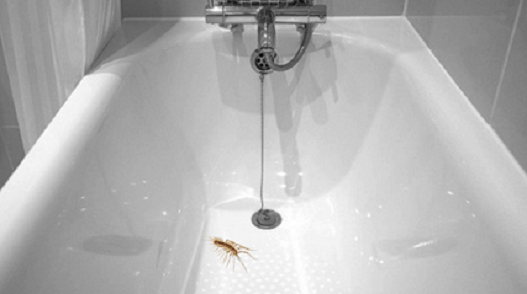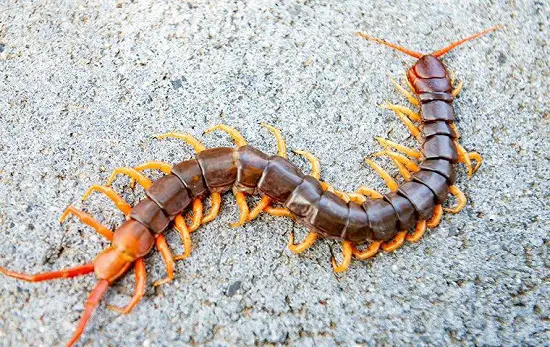House centipedes are a common species of household creatures. They are usually not of any significant size. You may, therefore, not notice them at the early stages of infestation. However, before you jump straight at the signs of infestation or even centipede control, you should know what you are about to deal with. As common as centipedes are, you may not even recognize them or what they look like. So how about we start there?
What Are House Centipedes?
House centipede is the common name for the species Scutigera coleoptrata. They have a yellowish-grey color and 15 pairs of highly mobile legs. House centipedes are nocturnal insects and are usually very active at night. It is quite easy not to notice them in your house during the day. Finally, house centipedes are good hunters too.
Frequent sighting of house centipedes is a sign that your house has become an abode for them. Usually, there is no cause for alarm; house centipedes are not parasitic, so they have no business hurting you or feeding on your blood.
However, in most cases, house centipede infestation is a sign that there are other household pests in your house. You can never tell, some of these insects may be dangerous, and if you are the sensitive type, they end up making you uneasy.
Centipedes seize the opportunity of the darkness to hunt for prey. They use their antenna for fishing out prey, and they inject venom into the prey when they catch it.
For pests, centipedes have pretty fast reflexes. House centipedes prefer insects like cockroaches, crickets, and ground beetles. Finally, house centipedes are likely to show up in your home during spring or fall. They could also use the moisture and the warmth, you know.
Signs of House Centipede Infestation
Aside from randomly seeing house centipedes everywhere in your house at night, here are some obvious signs of infestation:
Daylight activity of house centipede –These creatures would never move around during the day; whenever it gets so bad that you start to sight their movement in the afternoon, it means infestation.
You feel intermittent crawling on your skin at night –When you begin to feel intermittent crawling on your skin at night when you sleep, it may mean two things. First, you have a bug infestation, and you know what comes after a bug infestation, don’t you? House centipedes are lurking around to feast on these insects. But, on the other hand, house centipedes – at the peak of infestation – may crawl on your skin at night instead of insects.
What Causes Centipedes in The House?
The truth is, centipedes are not usually on the lookout for your houses. In the open, centipedes carve their niche in soft wooden logs, rich soil, or underneath humid piles of leaves and mulch. So when you notice these creatures indoors, your house must have just what they need to make them comfortable. The following environment provides the perfect resting place for house centipedes:
Fissured or blocked Gutters
A lot of houses do not have proper drainage systems. Good drainage systems are essential in keeping your home dry. Gutters redirect rainwater away from the foundation of your house. Although house foundations are made of concrete, they still crack regardless, especially excess water absorption. House centipedes are attracted to houses with improper drainage systems. They find the necessary moisture and darkness to thrive in the foundation cracks.
Pipe leakages
Noticing leaks could take days or weeks. Pipe leaks happen faster with seasonal temperatures, especially in winter. The low temperature causes water pipes to freeze and burst. Fixing these leaks may take time. The leak and the time it takes to fix them are just the cues for bugs and centipedes. The corresponding moisture and the warmth attract them to your house, and it may cause infestation.
Bad wax seal
Effective plumbing fixtures are airtight. The toilet system and tap network require air and water pressure to push water to the sewer line. During toilet installation, plumbers use wax seals to keep plumbing structures airtight. However, leaks can develop when the wax seals age or degrade. This situation is a beckon to pests, especially bugs and centipedes.
Garden Check
If the scape or environment of your garden is too appealing to many insects, then be sure they will make their way into the comfort of your home. When they do, predators like centipedes will crawl in, and this causes an infestation.
Where Do Centipedes Come from in The Bathroom?

House centipedes cannot retain moisture. Due to this, the bathroom is the perfect hiding place for them. It is not only warm, but it also has the right amount of moisture. Here are some of the most convenient places for centipedes in your bathroom:
- Bathtub Crevices
- Drain systems
- Wall cracks and fissures
- Inside your basin
Should I Be Worried If I Find My Centipedes in My House
House centipedes are generally not a threat to you as a human. The best their venoms can do is insects. Even rodents and small animals are unaffected by their house centipedes (this means your pets are safe). Also, house centipedes do not sting. In a sense, they are biological means of controlling bugs and other insects in your house. So the only thing you should be worried about is an infestation. You do not want centipedes running around on your couch, do you?
How to Get Rid of Centipedes
It is possible to get rid of centipedes by yourself. Different pest control options include household and DIY products and industrial and synthetic products. However, these chemicals must be handled with care, especially with kids and pets around. Here are some proven methods of getting rid of centipedes
Liquid Insecticides
Liquid insecticides are good options on surfaces and the entrance into cracks and crevices outside the reach of traps and other chemicals. Liquid insecticides can be used indoors and outside of the home, depending on the product description.
Ultrasonic Pest Control
Ultrasonic pest control is an easy but not so reliable method of ridding your house of centipedes. These are plugged into outlets around the home where insects can hear the frequency of sounds they emit emitted. You are sure to find centipedes where insects are gathered. It is, therefore, easier to eliminate them.
Adhesive Traps
Adhesive traps are one effective means of ridding your home of house centipedes. These are also capable of trapping preys aside trapping. Therefore, in the end, even if you do not get the centipedes, it is a win-win
Essential Oils
Home-made essential oils can help prevent centipede infestation. Diluted portions of peppermint oil in spray bottles, for instance, directly inhibits their movement. However, you must consider how compatible your preferred mixtures are with your house’s floors, furniture, and fabric. Finally, pets can be in danger of these oils, so you should ask your vet about the safety of these oils before you spray in your pet’s zones.
Professional Care
Dealing with multiple house centipedes is not always as easy as they appear. It then becomes necessary to consult a professional who will help to combat these centipedes. Experts in the field will inspect your house, identify the problems and invent ways to stop them. In addition, experts are often conscious of eco-friendliness. You, therefore, do not need to worry much about your pets and safety.
Thorough cleaning
Regardless of the control methods you use, they sometimes won’t just leave. You must be intentional about removing all other pro-centipede signs in your house. Cleaning is important. Damp places should be taken care of, crevices should be fumigated, and cracks should be fixed. House Centipedes can also be vacuumed on sight. So, the next time a centipede crawls or sneaks up on sight, you can vacuum, seal, dispose of the vacuum bag to prevent them from escaping.
Indoor insect barrier
You should note that you may want to focus more on insect and bug control in some cases. You are surprised. Don’t be! Sometimes, it is because your house is unclean or damp. Centipedes are only just attracted to food. So, it is natural that you find them around. Insects and centipedes around doors and windows casings can be controlled with a barrier. The insect door barrier helps to protect your home from the entry of house centipedes just outside your house.
Read Also: How to clean your house after worms
Does Killing a House Centipede Attract More?
Yes! Killing a house centipede attracts others. It is common to see insects come back for another dead insect. Most insects and critters consume other dead insects and pests. The same applies to house centipedes. Due to this, when you kill house centipedes, you must make sure to get rid of them. It would be best in your interest to dispose of them properly to prevent others from coming back.
Does White Vinegar Kill them?

Pouring a cup of white vinegar poured down sink pipes and drains is one of the simplest ways of eliminating house centipedes. However, you may also decide to add half a cup of baking soda to make it more effective. This mixture keeps insects, bugs, and centipedes away from your plumbing system.
Conclusion
It takes a considerable amount of conscious efforts to expel house centipedes. Although they are not dangerous to humans or pets, you must make sure to remove them before they embarrass you. Remember, when attempting DIYs, you must prioritize the safety of yourself, your pets, and your children. If you can no longer handle the infestation, call a professional. Of course, you will pay in cash; it is the small price you pay for freedom!

